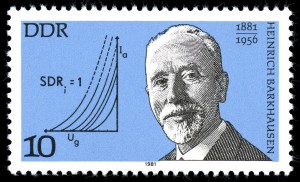Where does Barkhausen get its name?
At the same time as I formed Barkhausen (as a band) I was also planning to start producing guitar pedals and/or Eurorack synthesizer modules. This enterprise was to be called Barkhausen Effects.
I’ve given up the idea of making electronic products. It’s hard to imagine how I could have made it a profitable venture in New Zealand, where there are enormous input tariffs on imported goods and the dollar is weak against foreign currencies. The price of my products would not have been remotely competitive. I could have had them produced in China or somewhere where labour is cheap but ethically I couldn’t countenance that. And then there was the prospect of actually hand-building hundreds of objects, all that soldering and such. It would have taken up a huge amount of time and energy.
I enjoyed the journey but in the end I’d rather just make music.
The rest of this post (which was originally written in 2015) relates to Barkhausen Effects:
I was originally planning on calling this enterprise Vollgas Klang Effekte, which translates from the German as “full throttle sound effects”. It had that gruff (vulgar) Germanic ring to it, especially if you said it in a Heavy Metal-inflected sorta way. Despite it sounding good it was silly. That’s not a bad thing in itself, but I was looking for something that actually meant something to me. And I found it.

(image courtesy WikiMedia Commons)
Reading through books on op amps, audio and feedback circuits I came across this German physicist named Heinrich Barkhausen, a pioneer in things to do with magnetism, sound and feedback. He also has a nice face. Among his discoveries are two named after him:
The Barkhausen Stability Criterion: is the mathematical condition that must be satisfied for a linear electronic circuit (such as an amplifier) to oscillate. You might say that when Jimi Hendrix got near enough to his amp for his guitar to feed back, he was satisfying the Barkhausen Criterion.
The Barkhausen Effect: is a name given to the noise in the magnetic output of a ferromagnet when the magnetizing force applied to it is changed, and provides evidence that magnetisation affects a ferromagnetic domain rather than individual atoms on their own.
There’s a YouTube video demonstrating the Barkhausen effect, the noise made when waving a metal rod past a coil of copper wire (it hisses like an angry polecat). I can’t say it’s a thrilling video, but Barkhausen is famous in Germany for this kind of thing, and probably should be famous amongst musicians — his work is at the very core of oscillator design, and hey, where would we be without oscillators? No radio, no recording equipment, no electronic amplifiers, no Jimi Hendrix (well, Jimi would still have been alive but he might have played the banjo).
Putting an ‘s’ on the end of Barkhausen Effect seemed perfect as the name of a venture devoted to audio, audio feedback, and mysterious noises. I’m happy to honour Herr Barkhausen, who next year will celebrate the 135th anniversary of his birth and the 60th of his death [I never understand why people celebrate someone’s death, unless it was somebody you really didn’t like much, like Mussolini. But there were actually a lot of people who liked Mussolini. But we also know what happened to him. But I digress…].
Finally, the etymology of Barkhausen is kinda fun too:
bark. [bahrk] \ˈbärk\ n. the sharp explosive cry of a dog, fox or seal; v. to utter abruptly or aggressively.
hausen. [haw-zuh n; German hou-zuh n] \ˈhau̇-zən\ v. to wreak havoc.

(image courtesy Wikimedia Commons)
Hausen is also the name of the beluga or European sturgeon, Huso huso, a source of a blue-black caviar on the Black Sea that can live as long as 118 years and can generate extremely loud infrasonic shock waves, which apparently are used to attract the opposite sex. But this seems unrelated so I won’t mention it again. Barking sturgeons makes no sense.